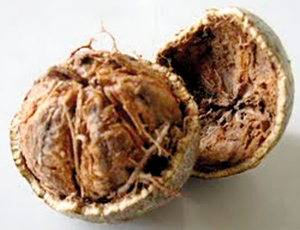Wonders of Woodapple
It is a local favourite among young and old alike. The fruits are available throughout the year but can be seen in abundance on the roadsides during October and November. Named “Woodapple” due to its hard wooden shell, the fruit is known as “divul” in Sinhala and “Vilam Palam” in Tamil. The woodapple is native to the Indian sub-continent- Bangladesh, India, Pakistan and Sri Lanka.

The sweet and sour juice of the woodapple is a perfect thirst quencher on a warm day. One of the best loved recipes made with the fruit is the wood apple sherbet and the “Divul Kiri” which is a delicious mixture of the pulp, jaggery and coconut milk. The pulp, when made into a drink or dessert is not only refreshing but also an excellent source of Vitamins and minerals including Calcium, Vitamin C, Phosphorus and Iron. The ripe fruit is rich in beta-carotene (Vitamin A), Thiamine and Riboflavin (Vitamin B).
The delicious taste of the jam and the unique flavour of wood apple pickle are also a firm favourite for most Lankans. The chutney made out of the wood apple is a welcome addition to a mundane rice and curry meal. In some Sri Lankan homes, the raw pulp of the wood apple is thoroughly dried and used as a substitute for lime. Culinary experts have devised innovative ways of using wood apple such as sauces and salad dressings.
It is a majestic tree that can be easily identified particularly in the dry zone where it is cultivated as a minor cash crop. This versatile fruit is also known as “elephant apple” as it is a favourite of elephants who consume the pulp and scatter the shells.
In appearance, the woodapple is unassuming with its brownish shell that has to be broken with a large knife or a hammer in order to remove the dark brown pulp. The pulp carries a few soft white seeds and has a sour taste that has to be teamed with some sweetness.
Wood apple is a versatile fruit that carries a host of benefits. In Sri Lanka, it is used as a cleaning agent as the pulp has properties that are similar to soap. A regular intake of woodapple is believed to improve bowel habits and digestion, reducing the risk of breast cancer (in women) and aiding in the treatment of skin diseases, stomach upsets and respiratory conditions.
The woodapple processing industry in Sri Lanka is steadily developing. Value added products manufactured in Sri Lanka include jams, pickles, chutneys, cordials, juice, cream and ice cream. Research and development activities in this area should focus on developing value added products that are not only environmental and consumer friendly, but also increase shelf life and preserve the nutrients of the products.



